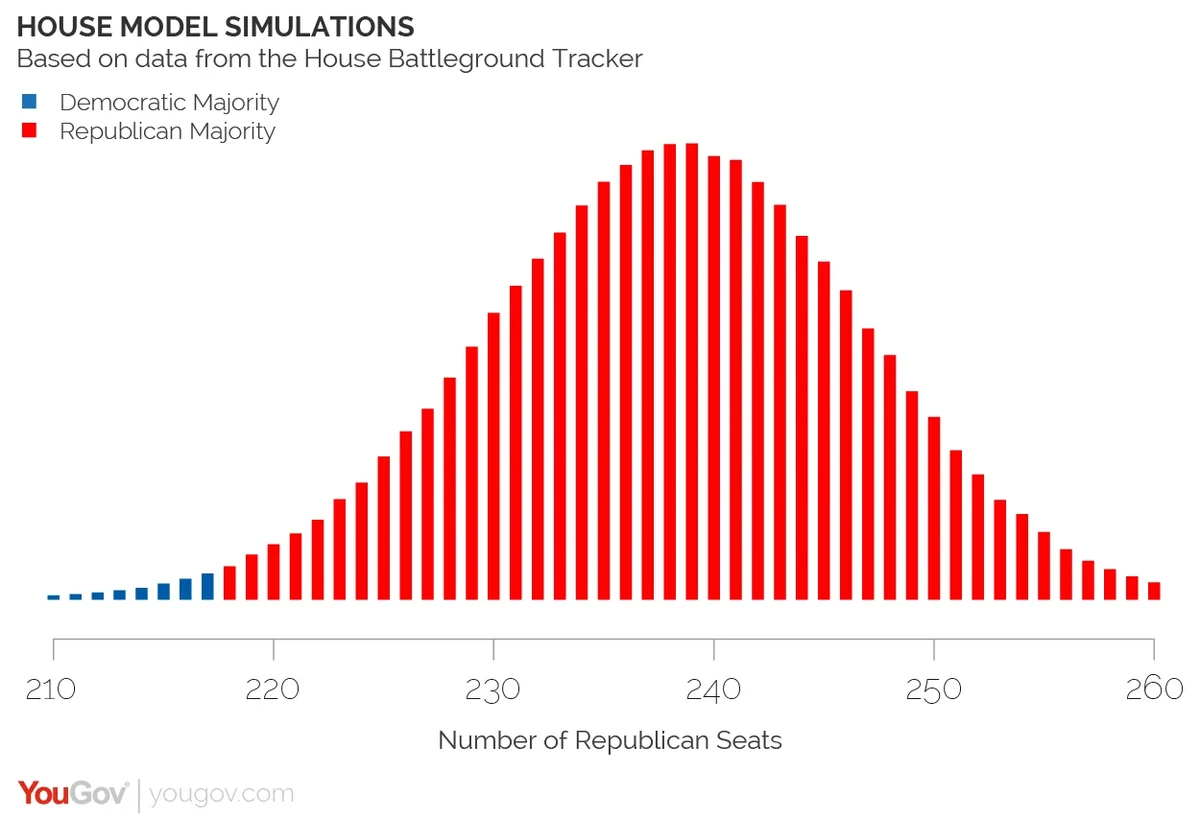Based on YouGov's estimates for all 435 House districts, the Republican Party will most likely add around 6 to 12 seats to their majority
Doug Rivers and Anthony Salvanto: The House Battleground Tracker estimates find the Republicans poised to keep majority control – as most observers expect – and will most likely add to that majority, gaining 6 more seats and possibly as many as 12.
See the full House Battleground Tracker data
The Tracker collected interviews in every one of the 435 House districts. These were used to model the probability of a Democratic or Republican victory in each district. The distribution of outcomes in our seat-by-seat House simulations suggest that the upper bound is most likely 246 Republican seats (plus-12) whereas the lower bound would be a loss of 3 seats to the Democrats.
This overall estimate is based on seat by seat estimates, not on a generic national ballot. We collected samples in all 435 House districts, and collected larger samples in the most competitive districts, as identified by CBS News and the New York Times heading into the fall campaign, to give better estimates for the most competitive races. We then have estimates for nearly all races*. To get the total seat gain, we randomly generated election outcomes using the estimated probabilities given the margin of sampling error. The simulation then computes the proportion of simulations with each party winning a particular number of seats.

Grouping these into categories, we can consider districts “tossups” when they are within two points of a tied race (there are nine of these); “lean” extends to six points from a 50/50 race; “likely” to ten points and “solid” are leads beyond that, which make up the bulk of the districts.

Taken as a whole, the estimate tells the story of a Republican-leaning year, as their voters have consistently expressed greater enthusiasm and independents lean to the GOP, too. But there are profound structural factors underlying the GOP’s hold on the House Chief – among these is voters’ partisanship, as most districts consistently back a single party and crossover voting for the House has all but vanished in recent cycles; and (related to that) heavily gerrymandered districts in almost every state that are drawn to distinctly favor one party over the other.
There are other demographic factors to add to that, such as Democrats living in more densely populated areas with lopsided majorities, so that their voting strength is not spread evenly across districts. The staunch partisanship of districts has added to the difficulty of flipping a seat, even open ones (less than one in ten seats have flipped over the last ten years, and most of the ones that have happened in the “wave” years of 2006 and 2010.) So the parties simply did not fund challengers or contest many House seats this year from the get-go. Even at the outside, many analysts (including CBS News) had perhaps 40 or 50 seats, or ten to fifteen percent of the House, on their radar as potentially competitive districts at the start of 2014. Today our simulation finds less than ten percent of the House are competitive races.
The House Battleground Tracker model incorporated district-specific information, including past Presidential and Congressional vote in the district, campaign spending, and incumbency, in addition to respondents’ likelihood of voting and expressed vote intention. The model estimate is a weighted average of the sample proportion intending to vote for each party with the expected proportion based on past voting and other district-level information. The survey responses and statistical model are weighted according to their estimated error. Where the number of interviews is large the estimate primarily reflects the survey. Where the number of interviews is small, past vote and spending are weighted more heavily.
*We exclude from our categorization three districts where the modeled estimates are close to even between the candidates and we have insufficient data because of low sample sizes to make a reasonable, individual determination about the state of that contest.See the full House Battleground Tracker dataSee more from the Battleground Tracker
An edited version of this post also appears on CBSNews.com







